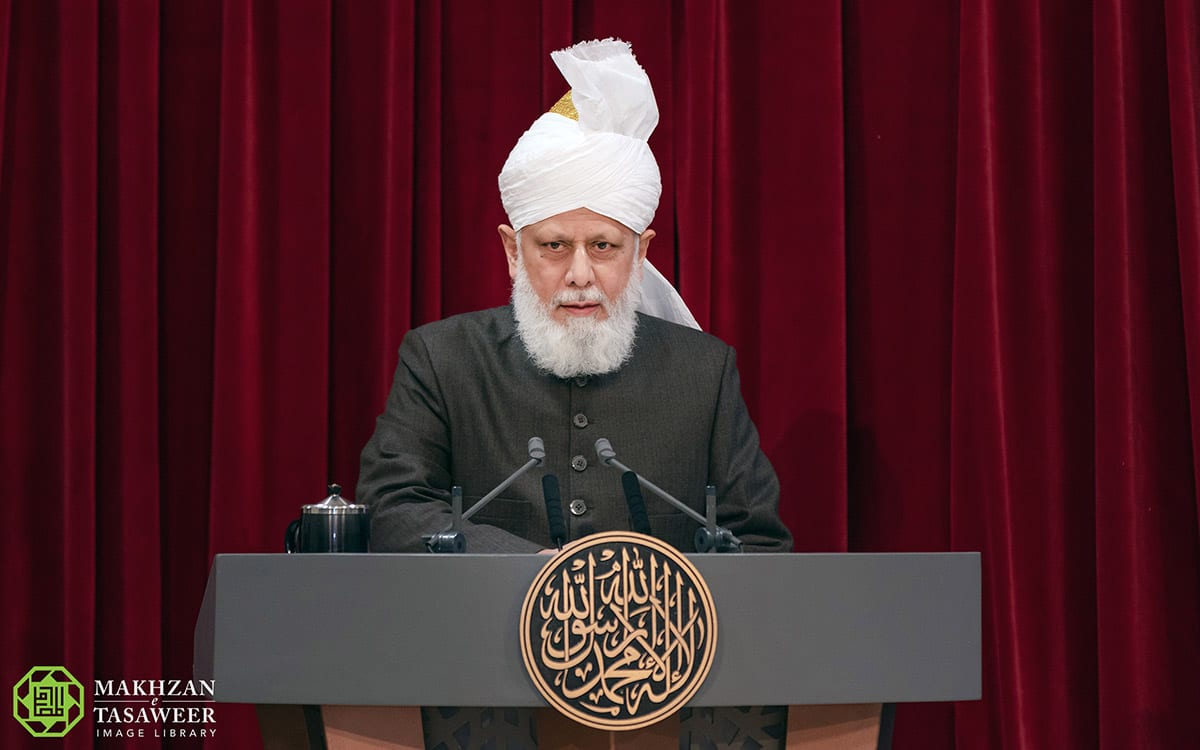Friday Sermon delivered by
Hazrat Mirza Masroor Ahmad(at)
Friday Sermon delivered at Masjid Mubarak, Islamabad, Tilford, UK
Rightly Guided Caliphs – Hazrat Umar (ra)
After reciting Tashahhud, Ta’awwuz and Surah al-Fatihah, His Holiness, Hazrat Mirza Masroor Ahmad (aba) said that he would continue highlighting incidents from the life of Hazrat Umar (ra).
Establishment of Qadha (Arbitration)
His Holiness (aba) said that Hazrat Umar (ra) also initiated the system of Qadha (arbitration). Judiciaries were established in every region, where Qadhis (judges) would be appointed. Hazrat Umar (ra) advised that justice should always be given precedence. Once, there was a dispute between Hazrat Umar (ra) and Ubayy bin Ka’b (ra). The matter went before a judge. When Hazrat Umar (ra) entered, the judge gave up his seat for him. Hazrat Umar (ra) told him that this was unjust, and sat beside Ubayy bin Ka’b to show that they should be treated equally.
Establishment of Ifta’ System (Issuing Edicts)
His Holiness (aba) said that Hazrat Umar (ra) also initiated the system of Ifta’ (edicts). People with knowledge of the Shari’ah (Islamic law) would be appointed to make decisions and issue edicts. Hazrat Umar (ra) ensured that only those appointed should give edicts, so as to avoid any confusion and false information.
Establishment of Policing System
His Holiness (aba) said that Hazrat Umar (ra) also initiated a system of policing. This was to ensure the safety of all citizens, and to ensure that the laws and rules were being followed. Hazrat Umar (ra) also established jails, which had not been in place before.
Establishment of a Treasury
His Holiness (aba) said that Hazrat Umar (ra) also initiated a treasury. Prior to the era of Hazrat Umar (ra), any wealth that was received would be distributed right away. During the era of Hazrat Umar (ra), a large amount was received from Bahrain, and upon consultation, it was decided that a treasury be established in order to safely keep such large amounts of wealth. Subsequently, this system of having a treasury was also established in all other provinces as well. Hazrat Umar (ra) would have grand buildings built for the treasury and there would be guards outside of it.
His Holiness (aba) said that once, Hazrat Uthman (ra) saw a man walking outside in extreme heat. When the man drew closer, he realised that it was the Leader of the Believers Hazrat Umar (ra). Hazrat Uthman (ra) asked him why he was outside in such heat? Hazrat Umar (ra) replied that a camel from the treasury had gotten away, and so he was out searching for it.
Initiatives Undertaken for the Betterment of the People
His Holiness (aba) said that there were various initiatives undertaken by Hazrat Umar (ra) for the benefit of all people. For example, he established various rivers and streams in order to provide water for all people.
His Holiness (aba) said that Hazrat Umar (ra) also established various buildings, such as mosques, judiciaries, barracks, various offices, guest houses, hotels etc. He also established security posts around Madinah in order to ensure safety.
Establishment of an Organised Military
His Holiness (aba) said that Hazrat Umar (ra) formally established and organised the army. He split the army into two parts; those who would go to war and those who were volunteers. Hazrat Umar (ra) would ensure that the moral training of soldiers was tended to. Hazrat Umar (ra) instructed that no soldier would go to a conquered area to conduct business as this would decrease their skills as soldiers. His Holiness (aba) said that today, we see that people in the army are always looking to conduct business in areas where they have defense colonies.
His Holiness (aba) said that Hazrat Umar (ra) ensured that each soldier was skilled in swimming, archery, and that they could run barefoot. He instructed that soldiers should not ride horses with their feet in the stirrups of the saddle, so that they could easily jump off into battle. Soldiers would be granted leave every four months in order to visit their families.
His Holiness (aba) said that during the era of Hazrat Umar (ra), even those who were not Muslim or who were not Arab would be commissioned at high posts. There are accounts that there were people of different backgrounds appointed to high ranks in the army. His Holiness (aba) said that these days, the Pakistani government does not allow Ahmadis to be part of the army, whereas if we look at history, Ahmadi officers have presented the greatest sacrifices for the sake of Pakistan.
Market Price Control System
His Holiness (aba) said that Hazrat Umar (ra) would ensure market price control and would see to it that the price of goods would not become too low, as that could undercut other vendors. Once, Hazrat Umar (ra) was walking through the market when he saw someone selling dried grapes at a very low price, which other vendors could not afford to do. Hazrat Umar (ra) instructed that he should either take his goods away from the market, or sell them at a similar price as other vendors of Madinah, which was a suitable and reasonable price.
Hazrat Umar’s (ra) Attention to Education
His Holiness (aba) said that Hazrat Umar (ra) paid great attention to education, Schools were established in all provinces, where educated people were appointed as teachers, and a salary was also appointed for these teachers.
Establishment of the Hijri Calendar
His Holiness (aba) said that the formal Hijri calendar was established during the era of Hazrat Umar (ra). The companions began recording dates from the time of the migration of the Holy Prophet (sa). Later, Hazrat Umar (ra) felt the need for dates to be recorded. Someone advised Hazrat Umar (ra) that he saw people in Yemen recording the date according to year and month. Hazrat Umar (ra) said that this style should be adopted. There are various narrations which show that the Holy Prophet (sa) recorded dates on certain occasions. However, it was during the era of Hazrat Umar (ra) that a formal Hijri calendar was established. It was decided to start the calendar from the time of migration, as other dates such as the birth of the Holy Prophet (sa) or the date of being commissioned as a prophet were not entirely clear.
His Holiness (aba) said that Islamic coins were also established during the era of Hazrat Umar (ra). These would have things such as Alhamdulillah (all praise belongs to Allah) and Muhammad Rasoolullah (Muhammad (sa) the Messenger of Allah) engraved on them.
His Holiness (aba) said that he would continue highlighting the life of Hazrat Umar (ra) in future sermons.
Funeral Prayers
His Holiness (aba) said that he would lead the funeral prayers (in absentia) of the following deceased members:
Sarpito Hadi Sahib from Indonesia who passed away last month. He accepted Ahmadiyyat when he was 21 years old. He is survived by his wife and eight children, one of whom is serving as a missionary, He served the Community in various capacities. He was passionate about propagating the message of Islam Ahmadiyyat. He treated everyone with great respect. It was his desire to continue propagating until his last days. His Holiness (aba) prayed that may Allah treat him with forgiveness and bestow His mercy and elevate his station in Paradise.
Chauhdary Bashir Ahmad Bhatti Sahib who passed away last month. His son is serving as a Missionary in Tanzania. He was a virtuous person, and was regular in prayers and fasting. He attended the Jalsa Salana (Annual Convention) in Qadian from an early age. He was a fearless Ahmadi and would face opposition with great bravery. He is survived by two daughters and five sons. His Holiness (aba) prayed that may Allah elevate his station in Paradise and enable his children to carry on his virtuous qualities. His Holiness (aba) also prayed that may Allah grant his son patience, as he was not able to participate in the funeral due to being in the field of duty.
Hameedullah Khadim Malhi Sahib from Rabwah. He was the grandson of a Companion of the Promised Messiah (as). He was a virtuous person who was regular in prayers and fasting. He was a very brave Ahmadi. One of his sons is serving as a life-devotee. His Holiness (aba) prayed that may Allah treat him with forgiveness and bestow His mercy.
Muhammad Ali Khan Sahib of Peshawar who passed away at the age of 89. He had devoted ⅛ of his wealth for the Community. He is survived by three daughters and seven sons. He accepted Ahamadiyyat at the hand of the Second Caliph (ra) and remained a devoted Ahmadi ever since. He served the Community in various capacities. He loved the Holy Qur’an and would study the books of the Promised Messiah (as). He was a very virtuous person, and would also financially support those in need. His relatives tried convincing him to leave Ahmadiyyat but to no avail. Eventually his relatives left him, but he remained steadfast upon Ahmadiyyat. His Holiness (aba) prayed that may Allah treat him with forgiveness and bestow His mercy and elevate his station in Paradise.
Sahibzada Mahdi Latif Sahib of USA. He was the grandson of Sahibzada Abdul Latif Shaheed. He had studied the books of the Promised Messiah (as) in great depth. He was regular in offering prayers as well as voluntary prayers. He loved Khilafat a great deal. He was humble, and had a great passion for propagating the faith. His Holiness (aba) prayed that may Allah treat him with forgiveness and bestow His mercy and elevate his station in Paradise.
Faizan Ahmad Samir Sahib from Rabwah who passed away at the age of 16 due to complications from Covid-19. He was a kind and gentle child. He was serious about his studies and avoided wasting his time. His Holiness (aba) prayed that may Allah grant patience to his parents and family, and may Allah treat him with forgiveness, bestow His mercy and elevate his station in Paradise.
Summary prepared by The Review of Religions.

